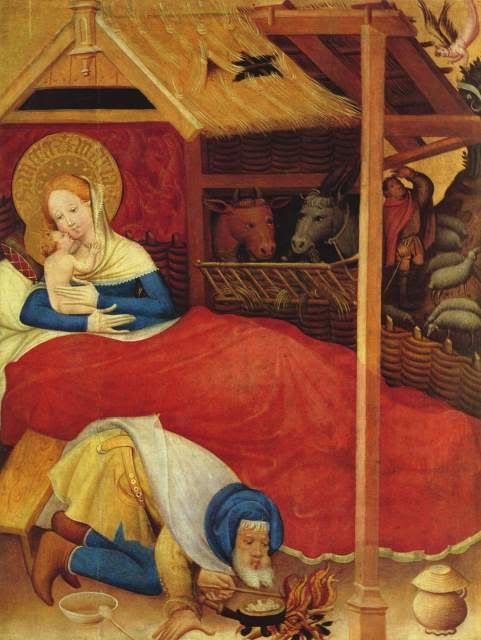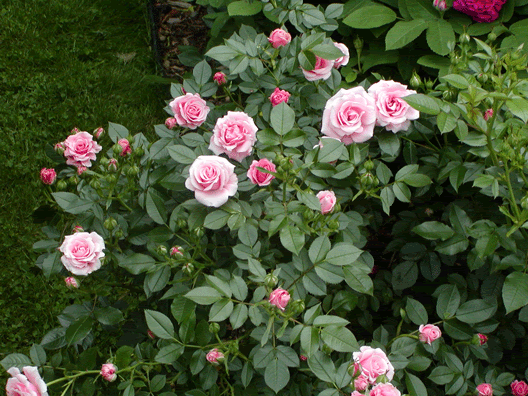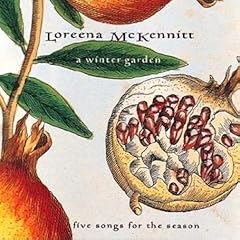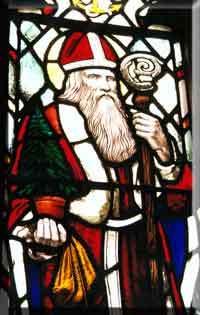
Here's a truly "Pre-Raphaelite" painting for you all! This Nativity scene was painted by Conrad von Soest in 1403. Von Soest, who was born in 1370 in Dortmund, was considered one of the greatest artists in Westphalia. He introduced the "International Courtly Style" of art to Northern Germany, and influenced Northern European art throughout the 15th century.
This image captured my eye because of its domesticity! For one thing, it was the first time I'd seen a nativity scene that featured Joseph cooking for his new family! Mary and Jesus look so tender as well (get a closer look at the expressions on their faces, and you'll know what I mean!).
Perhaps it's because this is my first Christmas with a little baby of my own, but this year I wanted to see rather more familial tenderness and a bit less distanced adoration among the Holy Family. No doubt Charles Dickens (who considered Milais' "Christ in the House of His Parents" sacrilegious for its frank portrayal of Christ's family) wouldn't have been very impressed with von Soest's more familial portrayal of the Nativity scene, but I'm sure the Pre-Raphaelites would have loved it!
On a side note, I find the ahistorical touches, such as the medieval clothing and any number of details in the painting, rather charming. Besides, I sometimes wonder if medieval artists were just trying to make historical paintings approachable for their audience. Perhaps by giving historical figures contemporary clothing and accoutrements, von Soest was ensuring that his audience would spend less time wondering why Mary and Joseph were wearing funny clothes! (what modern child didn't grow up asking their parents why Joseph ran around in a skirt and sandals all the time - I know I did!).
Happy Holidays to all, and much prosperity and happiness in the New Year!
Image courtesy of Wikipedia.
Thursday, December 24, 2009
Happy Holidays!
Posted by
Margaret
at
10:51 AM
3
comments
![]()
![]()
Sunday, March 23, 2008
An Easter Carol by Christina Rossetti
Happy Easter, everyone! I ran across this lovely Easter poem by Christina Rossetti this morning. Christina Rossetti was of course Dante Gabriel Rossetti's sister and a celebrated poet. She also served as a model for brother's paintings and played a role in the Pre-Raphaelite Brotherhood's inner circle.
An Easter Carol by Christina Rossetti
Spring bursts to-day,
For Christ is risen and all the earth’s at play.
Flash forth, thou Sun,
The rain is over and gone, its work is done.
Winter is past,
Sweet Spring is come at last, is come at last.
Bud, Fig and Vine,
Bud, Olive, fat with fruit and oil and wine.
Break forth this morn
In roses, thou but yesterday a Thorn.
Uplift thy head,
O pure white Lily through the Winter dead.
Beside your dams
Leap and rejoice, you merry-making Lambs.
All Herds and Flocks
Rejoice, all Beasts of thickets and of rocks.
Sing, Creatures, sing,
Angels and Men and Birds and everything.
All notes of Doves
Fill all our world: this is the time of loves.
Posted by
Margaret
at
12:06 PM
1 comments
![]()
![]()
Labels: holidays, poetry, pre-raphaelites
Tuesday, February 12, 2008
Roses and Valentine's Day

As Valentine's day approaches, I'm more and more drawn to the romance of roses. And it seems I'm not alone! There was an article in the paper yesterday that pointed out that in Saudi Arabia, the sale of red roses is forbidden at this time of year because red roses are associated with Valentine's day. This has led to a soaring black market in roses. Little wonder! Regardless of your religious persuasion, there is something irrisistable about roses.
Perfume is one of those things that it took me a while to appreciate. As a little girl, I remember watching my mother as she carefully chose her perfume as the final step of getting ready to go out. She wore perfume every day and it always matched the season and occassion perfectly. I loved looking at all the beautiful bottles arranged delicately on a mirror that sat on top of her dresser. She would let me try different scents out and I always loved deciding which one to sample next. She would always ask me if I wanted a perfume for Christmas, but I usually said no. I loved perfume, but it didn't seem important enough to choose as a Christmas present. Maybe it's because I could have all the perfume I wanted at home!
When I went to college, that's when my love affair with perfume started. I realized that I like a lot of older perfumes, especially Jean Patou's "Joy" and "1000." My friends thought it was hillarious that I had such a giant collection of perfumes, but they liked trying them too!
Since I've already revealed "Joy" and "1000" as two of my favourite scents, you've probably figured out that I'm a huge fan of rose-scented perfumes. My all-time favourtite, though is Nahéma. The first time I actually tried it was at the Guerlain Champs Elysees show room in Paris!(Every perfume lover should go there at least once!). It was my favourite scent that I tried that day and I fell in love. In addition to rose, it has notes of bergamot, mandarin, peach, cyclamen, lily, vanilla, sandalwood--and to me it's the ultimate rose perfume. The fragrance was created in 1979 and supposedly inspired by Catherine Deneuve. The name itself comes from “the daughter of fire”, from Scheherezade’s (of One Thousand and One Nights fame) tale of “two twin princesses, of equal beauty but of different nature.” It's a sexy scent that will definitely make you feel like a "daughter of fire."
If you like rose scents, here are a few others you might try:
Bal A Versailles--my mother's signature scent, by Jean Desprez. Sadly, it's difficult to find these days, except in a cologne. Last time I talked to the people at Nordstrom they said there's been some kind of property dispute over the roses used to make it!
Rose Absolue, by Annick Goutal--this fragrance comes in a wide variety of forms which is important if you really fall in love with a scent! You will want to try soap, bath gel, etc. and the possibilities are endless with this particular one. Also, all the scent in Annick Goutal's fragrances is totally natural, which makes it blend so much better with your own chemistry.
Joy, by Jean Patou--a total classic and comes in body cream, lotion, perfume, bath gel and lots of other lovely products.
Stella McCartney--I really love this one! It's new but it has a delightful, strong rose scent. Try the deodorant. It sounds weird, but it's fabulous! I can't live without it!
L'Occitane also makes a really lovely and more affordable rose fragrance that smells quite a bit like Stella but is all natural. Their bath products are amazing and I highly recommend this one.
Posted by
Margaret
at
10:10 AM
2
comments
![]()
![]()
Labels: holidays
Monday, December 24, 2007
Christmas Eve
I have been so busy this week that it's been difficult to find time to post! My husband and I are visiting my mom's house and having a wonderful time. It's his first time visiting the house where I was born and it's been really special to be able to share with him all of our Christmas traditions!
I am having such a good time here! I re-discovered a treasure trove of my mom's needlepoint and design books that I can't wait to share with you all! I also found an abandoned needlepoint project (a rose pin-cushion) that is keeping me busy!
It's probably going to be pretty difficult to find much time to post before New Years' (that's when we are returning home). I hope everyone is having a great Christmas!
Posted by
Margaret
at
1:07 PM
0
comments
![]()
![]()
Labels: holidays, needlework
Wednesday, December 12, 2007
The Origins of Christmas Celebrations
Most of us are aware that Christmas falls very close to midwinter solstice (Kwanzaa and Hannukah aren't that far off either). The date for Christmas was set by Rome in the third century AD in order to coincide with (and hopefully to supersede) the pagan festivals devoted to Saturn (King, 134).
Many of our modern celebrations of the holiday are clearly derived from Roman customs surrounding the Saturnalia fire festival. At this time of the year, homes were bedecked with "evergreens, candles, and specially constructed lanterns"(King, 134). Gifts were given and were even giftwrapped in coloured cloth!(134) Special foods such as exotic fruits, nuts, sweet bread and "pastries pressed in the shape of stars" were eaten along with cider and mulled wine (134).
The midwinter celebrations of the Celts had more to do with sun-god. Yule log superstitions have existed for many years in Celtic society. Despite numerous claims, it is not known whether the Christmas tree phenomenon originated with the Druids. I'm always suspicious of claims regarding "the first Christmas tree"--whether Martin Luther or the druids are credited, and it seems safer to me to stick with Queen Victoria since she's the first person we can be sure about having an actual Christmas tree.
The burning of the Yule Log was connected to the sun-gods purifying abilities and bringing the wood inside was a metaphor for inviting the sun-gods blessing into the home (135). Interestingly, the word Yule is derived from the Middle English "yole" and is perhaps related to our modern English words "yolk" and "yellow"(King, 135), which would make sense, since the sun appears yellow to our eyes.
Holly and Ivy are still probably the plants we most associate with Christmas. In ancient times, they were connected to the worship of Saturnalia, whose "club was of holly wood" and whose "sacred bird, the gold-crested wren, nested in ivy" both plants were also associated with the druids(King, 136).
There are many theories as to why the Roman empire chose to celebrate Christmas at this time of year. Some staunch traditionalists argue that Christmas falls at the same time of the year as Christ's actual birth. Others believe the holiday was set to occur at yuletide as a means of distracting pagans from their former rituals and giving them something else to celebrate. There are even christians who argue that Christ's birth should NOT be celebrated at this time of the year, since it comes dangerously close to glorifying the pagan past...
Regardless of which party is correct, I think it is perfectly fitting that Christmas comes at this time of year. In the Northern Hemisphere, Solstice marks the point in the calendar when days grow longer and the nights become shorter. What more fitting point in the calendar to welcome the birth of the "Son of God" or "Light of Lights"? Alternately, if one is of the pagan persuasion, I should think Christmas must seem far more innocuous than, let's say, Easter, since it's a celebration of life and new birth (which fits quite well with many neopagan religions). I guess I'm just a little sad everyone can't just get along. It seems to me that everyone--Christians, Atheists, Pagans and people from all religions--could benefit greatly from a little celebration at this time of the year, no matter what they're celebrating.
Reference: King, John. The Celtic Druids' Year. Blandford: London, 1994.
Posted by
Margaret
at
1:13 PM
2
comments
![]()
![]()
Labels: holidays, philosophy
Tuesday, December 11, 2007
Loreena McKennit: A Winter Garden
I thought I'd heard pretty much every one of her albums until I ran across this little gem at Chapters the other day. I've always listened to To Drive the Cold Winter Away obsessively during the Christmas season and I had no idea she had another Christmas album. A Winter Garden was a revelation for me.
The first three of five tracks on A Winter Garden will be familiar to listeners. "Coventry Carol," "God Rest Ye Merry, Gentlemen" and "Good King Wenceslas" are Christmas standards sung with their traditional tunes, through McKennitt has created interesting arrangements for them.
Coventry Carol is hauntingly beautiful and the arrangement is quite traditional. The arrangement for "God Rest Ye Merry, Gentleman" is overtly Celtic and might require a bit more getting used to (it sounds like a marauding band of ancient gypsies doing their own interpretation of the tune). "Good King Wenceslas" is a bit more modern in feel, it is still very traditional.
My favourite piece from the album is "Snow," a poem by Archibald Lampman (1861-1899) set to McKennitt's own music. It has that tremendous mystical and romantic quality that is the hallmark of her work. My only real quibble with the album is that this song should come at the end. It forms a nice bookend with "Coventry Carol."
The album's final track "Seeds of Love" is also composed by McKennitt and is the weakest link in the album. The melody is lovely, but the lyrics themselves, though traditional, just aren't as powerful as those of the other songs. Nevertheless, the album ends to quickly--it will leave you wanting more. I think it's time she came out with another Christmas album!
Posted by
Margaret
at
10:04 AM
3
comments
![]()
![]()
Thursday, December 6, 2007
Saint Nicholas Day
Posted by
Margaret
at
11:36 PM
0
comments
![]()
![]()
Labels: holidays




